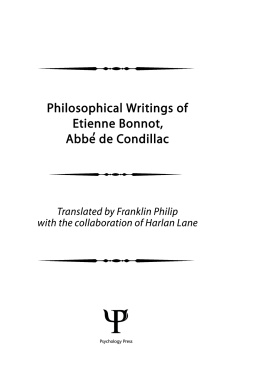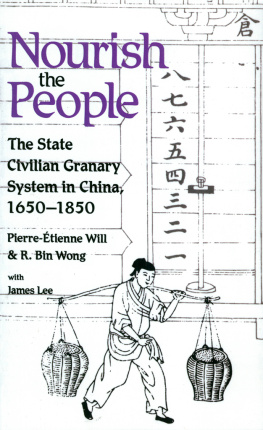Philosophical Writings of Etienne Bonnot, Abb de Condillac
Philosophical Writings of Etienne Bonnot, Abb de Condillac
Translated by Franklin Philip
with the collaboration of Harlan Lane
First Published 1982 by Lawrence Erlbaum Associates, Inc.
This edition published 2014 by Psychology Press
711 Third Avenue, New York, NY, 10017
and by Psychology Press
27 Church Road, Hove, East Sussex, BN3 2FA
Psychology Press is an imprint of the Taylor & Francis Group, an informa business
Copyright 1982 by Lawrence Erlbaum Associates, Inc.
All rights reserved. No part of this book may be reprinted or reproduced or utilised in any form or by any electronic, mechanical, or other means, now known or hereafter invented, including photocopying and recording, or in any information storage or retrieval system, without permission in writing from the publishers.
Trademark notice: Product or corporate names may be trademarks or registered trademarks, and are used only for identification and explanation without intent to infringe.
Library of Congress Cataloging in Publication Data
Condillac, Etienne Bonnot, de, 1714-1780.
The Philosophical writings of Etienne Bonnot de Condillac.
1. Thought and thinkingAddresses, essays, lectures. 2. Senses and sensationAddresses, essays, lectures. I. Title.
B1982.E5 1982 194 81-12462
ISBN 0-89859-181-3 AACR2
Publisher's Note
The publishers has gone to great lengths to ensure the quality of this reprint but points out that some imperfections in the original may be apparent.
ISBN 978-1-315-80281-7 (ebk)
Contents
BOOK I:
A TREATISE ON SYSTEMS |
BOOK II:
A TREATISE ON THE SENSATIONS |
BOOK III:
LOGIC, OR THE FIRST DEVELOPMENTS OF THE ART OF THINKING |
In the course of the eighteenth century, two near contemporariesDavid Hume (1711-1776), writing in English, and Etienne Bonnot, abb of Condillac (1715-1780), in Frenchargued independently that the only available medium for constructing a rational understanding of reality is the individual person's successive instants in the having of sensations.
Within subsequent philosophy, the brilliant Scotsman has enjoyed a fame that almost totally eclipses the memory of the dogged Frenchman. This translation of three of the philosophical works of Condillac is being published in the hope of redressing the balance between the two.
Hume was skeptical about the reasonableness of certain common-sense assumptions, and the tensions created by his practically intolerable but seemingly irrefutable skepticism have helped to keep Humean metaphysics alive. Condillac, despite his official status as metaphysician for the acute critics of the French Enlightenment, was himself mostly not skeptical. The absence of tension between his sensationalism and common sense may, together with his compatriots' characteristic impatience with empirical ideas, account for Condillac's comparative obscurity even in French philosophy.
Condillac has had a continuing influence, however, on Western thought, for his constructive ideas have been incorporated into the behavioral sciences. From the first psychiatrist Philippe Pinel's use of observation of the mentally infirm to the application of Maria Montessori's sensory training of the child, the social sciences have explicitly relied on Condillac's genetic theory of mental operations.
Of the three books included in this volume, the first, the Treatise on Systems (1746), contrasts Condillac's philosophic system with rationalistic systems that end in contemplation rather than observation. The Treatise on Sensations (1754) details the development of knowing, desiring, and acting, beginning with a single impression in one sense modality and ending with the full reconstitution of the external and mental worlds of the individual. Finally, the posthumously published Logic (1792) elaborates Condillac's universal method for acquiring knowledge by a child, an adult, or a disciplinethe method of analysis.
Condillac came from a family belonging to the minor aristocracy of Grenoble. After receiving holy orders in the Catholic church, he dressed in a cassock but did not otherwise pursue the priestly vocation. Most of his adult life was spent in Paris, where he became acquainted with the leading intellectual figures of the time, including Voltaire, and often dined with Rousseau and Diderot. Accounts of salon life suggest that he was socially unassertive. He died at his estate in the Loire valley at the age of sixty-five.
These books have been translated from the French edition of Condillac's works edited by Georges Le Roy, Oeuvres Philosophiques de Condillac. Paris: Presses Universitaires de France, 1948.
This publication was made possible by grant number RL 28904-77-1364 from the Translation Program, Division of Research Grants and by grant number RP-2038-80 from the Publications Support Program of the National Endowment for the Humanities.
Franklin Philip
Harlan Lane
Philosophical Writings of Etienne Bonnot, Abb de Condillac
Book I:
A Treatise on Systems
A system is nothing other than the arrangement of different parts of an art or science in an order in which they all lend each other support and in which the last ones are explained by the first ones. Parts that explain other parts are called principles, and the fewer principles a system has the more perfect it is. It is even desirable to reduce all principles to a single one.
In the works of philosophers we can observe three sorts of principles from which three sorts of systems are formed.
The principles I put in the first class, as the most fashionable ones, are general or abstract maxims. They must be so evident or so well-proven that we cannot cast doubt on them. In fact, if they were uncertain, we could not be certain of the conclusions we draw from them. The author of the Art of Thinking is speaking about these principles when he says:
Everyone agrees that it is important to have in mind several axioms and principles that, being clear and indubitable, can serve us as a basis for understanding the most hidden things. But those that are generally given are so rarely useful that it is quite pointless to know them. For what they call the first principle of knowledge, "it is impossible for the same thing to be and not to be," is perfectly clear and certain; but I find no occasion where it can ever serve to give us any knowledge. I thus believe that the following can be more useful.
He then gives us a first principle: "Everything included in the clear and distinct idea of a thing can be truly affirmed of it." As a second principle: "The idea of everything that we conceive clearly and distinctly includes at least possible existence"; as a third principle: "Nothing cannot be the cause of anything." But it would be needless to relate the other principles; the ones just mentioned are sufficient to serve as examples.
Philosophers ascribe such great virtue to these sorts of principles that they naturally have tried to increase their number. Metaphysicians particularly distinguished themselves in this way. Descartes, Malebranche, Liebniz, and others outdid each other in lavishing them on us, and we have no one else to blame now but ourselves if we do not penetrate as far as "the most hidden things."
Principles of the second kind are suppositions formulated to explain things that we could not otherwise give an account of. If these suppositions do not appear impossible and if they provide some explanation of known phenomena, philosophers do not doubt that they have discovered the true guiding principles of nature. Would it be possible, they say, for a false supposition to yield an appropriate outcome? Whence arises the opinion that the explanation of phenomena proves the truth of a supposition, and that we should judge a system less by its principles than by the way it explains things. Suppositions that are at first arbitrary are considered to become indisputable through the skill with which they are employed.










